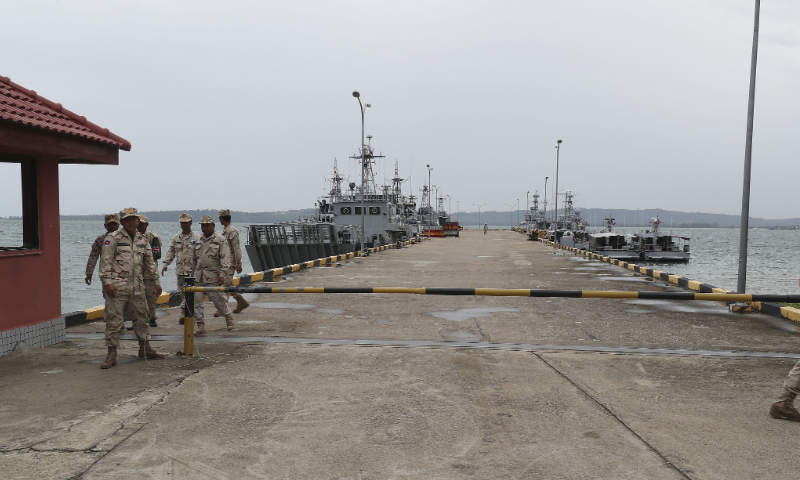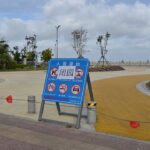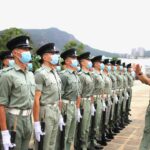Cambodian officials recently revealed that the China-assisted renovation project of the Ream Naval Base is nearing completion. The project, which officially commenced on June 8 last year, has been closely monitored and actively targeted for disruption by the US. The rapid pace of construction reflects efficiency of China, known as the “infrastructure maniac,” and has made the US more apprehensive.
According to reports from US media in recent days, satellite imagery showed that a major pier capable of anchoring aircraft carriers had been constructed on the site. This has become the latest “evidence” leading US officials to question whether the base is exclusively intended for use by the Chinese People’s Liberation Army (PLA) Navy. Coinciding with Cambodia’s general election, this has sparked a fresh round of smears and attacks on Cambodia and its relationship with China by the US public opinion.
Cambodian authorities have repeatedly refuted these rumors, stating that the project aims to enhance Cambodia’s defense capabilities, especially the combat capabilities of the Cambodian Navy, and contribute to peace, stability, and prosperity in the region. Actually, the US has no qualifications to meddle in this matter, let alone the right to oppose it. However, in the US media, “doubts from US officials” have been used as a pretext to openly demand an explanation from Cambodia. Some media outlets even quoted so-called “political analysts,” urging the Cambodian government to “be transparent” and “allay US suspicions.” Is there anything that highlights the bullying nature of the US more than this?
Imagine this analogy: A family plans to build a house on their own residential land. They invite their skilled and friendly neighbors, who are good at construction, to help them with the project. Suddenly, an outsider arrives and insists that they cannot build the house and should not seek help from their neighbors. Of course, the family would not listen to the outsider’s demands. However, as the house is nearing completion, the outsider comes back and questions, “Why are you installing a trap at your doorstep?” Now, does the family need to explain their personal matters to an outsider?
The US has been trying to conduct searches at the Ream Naval Base, but Cambodia has rejected their request. Prime Minister Hun Sen expressed his anger, saying, “Ream Naval Base is not a place for thieves or robbers. I allowed you to visit, not to investigate or inspect.” Moreover, the US does not have a search warrant, so in essence, they are bullying Cambodia. According to the Cambodian constitution, the country shall not permit any foreign military base on its territory, and this is entirely Cambodia’s own affair.
The Ream Naval Base used to be a place for joint training between Cambodia and the US Navy. At that time, there was no objection from the US. But now, since Cambodia is cooperating with China, it suddenly becomes a big issue. In fact, the US is in no position to demand Cambodia to “be transparent,” and Cambodia has no obligation to “allay US suspicions.”
US officials always claim that the intentions, nature, and scope of this project are non-transparent, which is the main excuse the US uses to pressure Cambodia. However, this argument is unfounded. We would like to ask: What is the US military’s intention in adding four military bases near the Taiwan Straits and South China Sea? What is the nature of the “THAAD” system deployed in South Korea? Who is the US going to target with the planned formation of a new Marine Littoral Regiment in Okinawa? Why is the US so uneasy about China’s normal overseas cooperation? If we talk about transparency, shouldn’t the US clarify these questions until the relevant countries are completely reassured?
It is necessary to emphasize that China has not established a navy base in the Ream Base and this has nothing to do with whether the US allows or is unhappy about it. It is a decision made independently by China and Cambodia. Sovereign nations have the right to establish overseas military bases on the basis of obtaining the consent of the host country. The US alone has about 800 overseas military bases, far more than the combined amount of other countries. China’s navy advancing into deep blue waters is a natural outcome, whether it is to safeguard China’s interests globally or better ensure regional and world peace. The Chinese navy needs more overseas support bases. Currently we only have one in Djibouti, and in the future, others should be established in suitable locations.
When that day comes, China won’t need to seek approval from the US or anyone else, nor will it halt its progress due to the objections of the US or others. Just because you hear the chirping of crickets, does that mean you should stop farming? China will openly, confidently, and resolutely do the right thing. As for the US’ malicious hype this time, we want to say that China’s cooperation with Cambodia is open, honest, and can withstand the test of time. The friendship between the two countries will not be affected by the interference and pressure from the US. Such friendly relations will only contribute to regional peace and stability.




